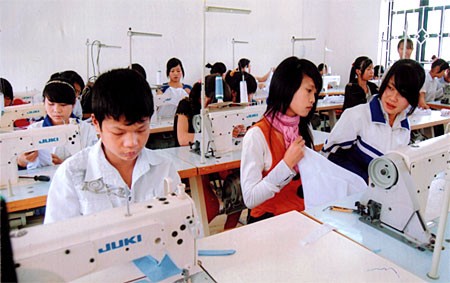 |
| Quality of vocational training centers in Yen Bai Province has improved to meet demand of employers. (www.baoyenbai.com.vn) |
(VOV) - Vocational training for farmers, to transfer advanced technologies, outline plans to develop production and select the best production models are considered essential to satisfy the criteria on new rural development. This is part of the ongoing work to restructure the labor force and increase people’s incomes.
Over 1.6 million farmers will be provided with vocational training as part of a project on vocational training for rural workers until 2020, known as project 1956. The National Center for Agricultural and Fishery Encouragement has run 11 pilot training courses in communes, which is proving extremely effective. At a conference to review the outcomes of the pilots, the Center said that most farmers who have completed training courses now apply more efficient technologies into agricultural production. Ha Thuy Hanh, the center’s Deputy Director, said that the project is of great socialization. She explains ‘In line with decision 1956, the farmers took training courses in four major groups of occupations. They include cultivating techniques, animal husbandry, forestry, and salt-production. The second is involved in processing agricultural, forestry, and aquatic products. The third is irrigation management, water supplies, and rural environment sanitation. And the last one is agricultural management and services. The Ministry of Agriculture and Rural Development has issued a list of 71 agricultural occupations. This enables rural workers to find out what is on offer and for provincial authorities to outline their specific policies on vocational training. We have recommended that more hands on training should be included so that as soon as the farmers have finished their courses, they can apply their new skills immediately. We should also help rural communities make the right choice of occupation, and local administration should support them financially for a period after they have finished their courses’.
Thuy Huong commune in Hanoi’s outlying district of Chuong My is one of the 11 pilot villages taking part in project 1956. 90 rural workers from the communes have also been trained in fruit growing using the recently introduced Vietnamese Good Agricultural Practices. Dang Dinh Vinh from Phu Ben commune is a long term fruit grower ‘I have done this kind of work for a long time so I want to learn the finer points. In the past, I just did everything blind without any training or advice’.
Le Thi Ngoc Xuan from Trung Hamlet in Tan Thong Hoi commune, Cu Chi District in Ho Chi Minh City is attending a vocational training course on animal husbandry and veterinary skills. She says ‘In the past, we did everything according to our previous experiences, and what we knew. After completing this course, I now know how to take care of my cows and pigs better. What to feed them and which diseases they might catch so I can provide them with the right treatments’.
In the future, the center will diversify its forms of training, with more focus on working alongside with businesses to generate jobs for rural workers and meet the demand from companies for trained employees.
VOV